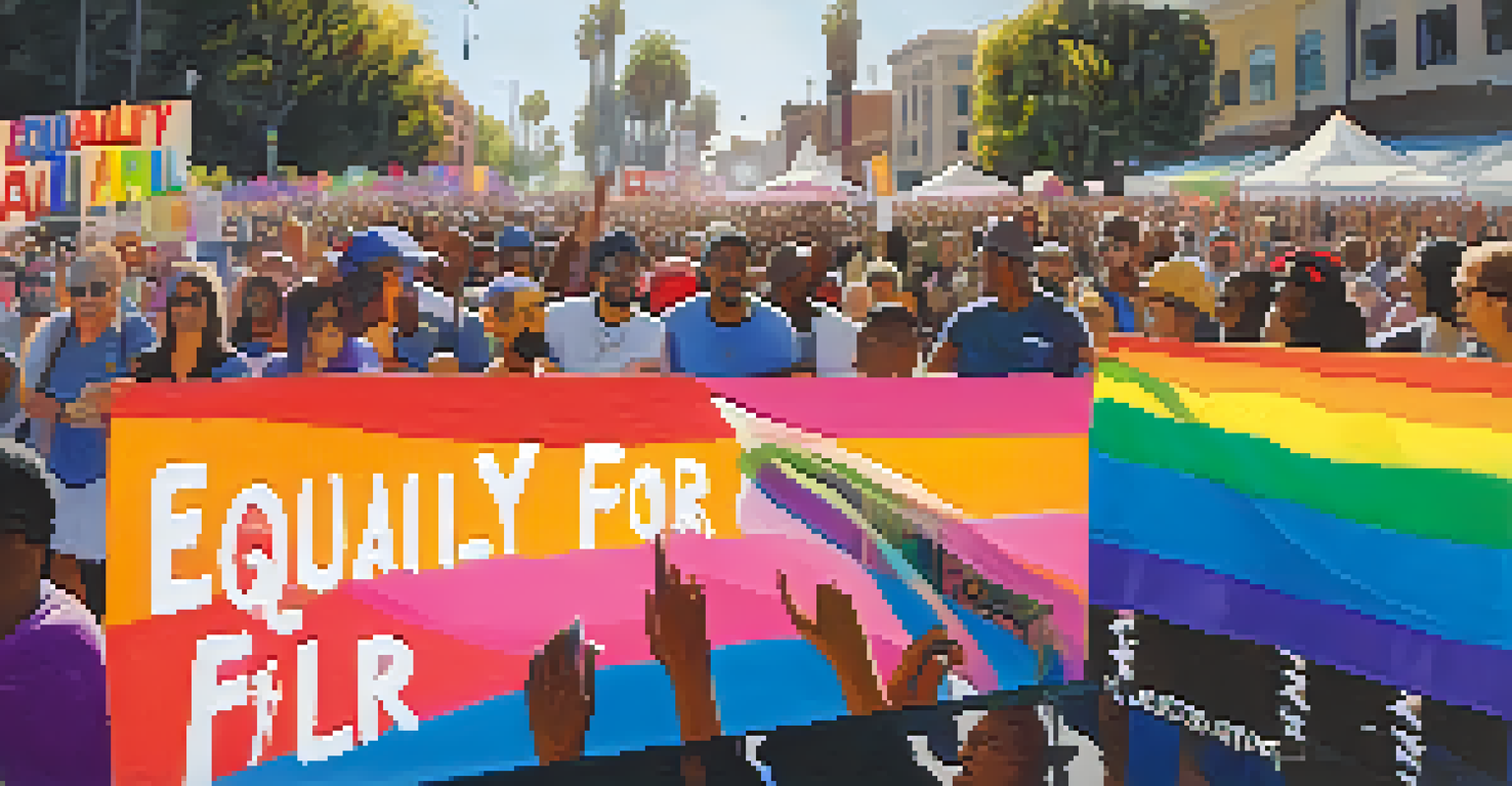Nonprofit Advocacy for LGBTQ+ Rights in Los Angeles

Understanding Nonprofit Advocacy in Los Angeles
Nonprofit advocacy plays a crucial role in championing LGBTQ+ rights in Los Angeles. These organizations focus on raising awareness, influencing policy, and mobilizing community support to create a more inclusive society. By leveraging their resources and networks, they work to ensure that LGBTQ+ voices are heard and represented in key discussions.
Activism is the rent I pay for living on this planet.
For example, nonprofits often collaborate with local government and businesses to promote equality and combat discrimination. They also provide valuable resources such as legal assistance, counseling, and education to empower individuals within the community. This multifaceted approach helps build a stronger foundation for advocacy efforts.
Ultimately, the work of these nonprofits is essential in fostering a culture of acceptance and understanding. Through their initiatives, they strive to eliminate stigma and create safe spaces for LGBTQ+ individuals, ensuring that everyone can thrive regardless of their sexual orientation or gender identity.
Key Nonprofit Organizations Leading the Charge
Several key nonprofits in Los Angeles are at the forefront of LGBTQ+ advocacy. Organizations like the ACLU of Southern California and the Los Angeles LGBT Center provide essential services and advocacy efforts aimed at protecting the rights of LGBTQ+ individuals. Their missions often include legal representation, healthcare access, and educational programs.

Another notable organization is GLAAD, which focuses on media advocacy and representation. By working with media outlets, GLAAD helps shape positive portrayals of LGBTQ+ individuals, challenging harmful stereotypes and promoting understanding. This kind of advocacy is vital for changing public perception and fostering acceptance.
Nonprofits Champion LGBTQ+ Rights
Nonprofits in Los Angeles advocate for LGBTQ+ rights by raising awareness, influencing policy, and providing essential resources to the community.
These nonprofits not only provide immediate support but also engage in long-term advocacy to influence legislation and policy changes. Their combined efforts create a powerful network that amplifies the voices of the LGBTQ+ community, making a lasting impact in Los Angeles.
The Role of Grassroots Activism
Grassroots activism is a vital component of nonprofit advocacy for LGBTQ+ rights. It involves mobilizing community members to participate in campaigns, demonstrations, and local events that promote equality. This hands-on approach empowers individuals to take an active role in shaping the policies that affect their lives.
The only way to deal with discrimination is to confront it head-on.
For instance, community-led initiatives often focus on issues like housing discrimination, healthcare access, and hate crimes. By organizing rallies and awareness campaigns, grassroots activists draw attention to these critical issues, fostering a sense of solidarity and urgency within the community. Their passion and dedication can lead to significant changes at both local and state levels.
Moreover, grassroots activism often complements the work of established nonprofits. By collaborating on initiatives and sharing resources, these groups can enhance their effectiveness and reach a broader audience. Together, they create a powerful force for change, demonstrating that collective action can lead to meaningful progress.
Combating Discrimination Through Policy Changes
One of the primary goals of nonprofit advocacy is to combat discrimination through policy changes. Nonprofits work tirelessly to influence local legislation, aiming to create laws that protect LGBTQ+ rights and promote equality. This often involves lobbying efforts, public campaigns, and collaboration with lawmakers.
For example, organizations may advocate for policies that prohibit discrimination based on sexual orientation or gender identity in housing, employment, and public accommodations. By presenting compelling evidence and personal stories, nonprofits can help legislators understand the importance of these protections. Their advocacy efforts can lead to successful policy changes that positively impact the LGBTQ+ community.
Grassroots Activism Drives Change
Grassroots activism empowers community members to participate in advocacy efforts, addressing critical issues like discrimination and healthcare access.
Additionally, nonprofits often monitor the implementation of these policies to ensure they are enforced effectively. By holding government agencies accountable, they help create a system that truly supports and protects LGBTQ+ individuals. This ongoing commitment to advocacy is essential for fostering lasting change.
Promoting Mental Health and Well-Being
Mental health support is a critical aspect of nonprofit advocacy for LGBTQ+ rights. Many individuals within the community face unique challenges, including discrimination, stigma, and social isolation, which can take a toll on their mental well-being. Nonprofits provide vital resources, such as counseling services and support groups, to help individuals navigate these challenges.
For example, organizations like the Trevor Project focus on suicide prevention and crisis intervention specifically for LGBTQ+ youth. By offering a safe space for individuals to express their feelings and seek help, they play a crucial role in promoting mental health and well-being. Their work highlights the importance of addressing the emotional needs of the community.
Furthermore, nonprofits often engage in educational initiatives to raise awareness about mental health issues affecting LGBTQ+ individuals. By fostering open conversations and combating stigma, they help create a more supportive environment where individuals feel empowered to seek help. This holistic approach to advocacy is essential for nurturing a healthy and thriving community.
Community Engagement and Empowerment
Community engagement is a cornerstone of nonprofit advocacy for LGBTQ+ rights. Nonprofits actively involve community members in their initiatives, fostering a sense of ownership and empowerment. This collaborative approach encourages individuals to voice their concerns and participate in decision-making processes that affect their lives.
For example, many organizations host workshops, town hall meetings, and social events that bring people together. These gatherings create opportunities for dialogue, networking, and sharing experiences, ultimately strengthening community bonds. When individuals feel connected and supported, they are more likely to advocate for change.
Mental Health Support is Vital
Mental health resources provided by nonprofits are crucial for addressing the unique challenges faced by LGBTQ+ individuals, promoting well-being and resilience.
Moreover, empowering individuals to share their stories can have a profound impact on advocacy efforts. Personal narratives can humanize issues and inspire action, drawing attention to the challenges faced by the LGBTQ+ community. By amplifying these voices, nonprofits can drive home the importance of their work and motivate others to get involved.
Looking Ahead: Future Challenges and Opportunities
As we look to the future, nonprofit advocacy for LGBTQ+ rights in Los Angeles faces both challenges and opportunities. While significant progress has been made, ongoing issues such as discrimination, inequality, and disparities in healthcare remain pressing concerns. Nonprofits must continue to adapt their strategies to address these evolving challenges effectively.
For instance, the increasing visibility of LGBTQ+ issues in mainstream media can serve as a double-edged sword. While it can raise awareness and promote acceptance, it can also lead to backlash and pushback from those resistant to change. Nonprofits must be prepared to tackle these counter-movements while maintaining their focus on advocacy and support.

Moreover, the rise of technology presents new opportunities for advocacy. Social media platforms can amplify messages, mobilize supporters, and raise funds more effectively than ever before. By leveraging these tools, nonprofits can broaden their reach and impact, ensuring that the fight for LGBTQ+ rights continues to gain momentum in Los Angeles and beyond.